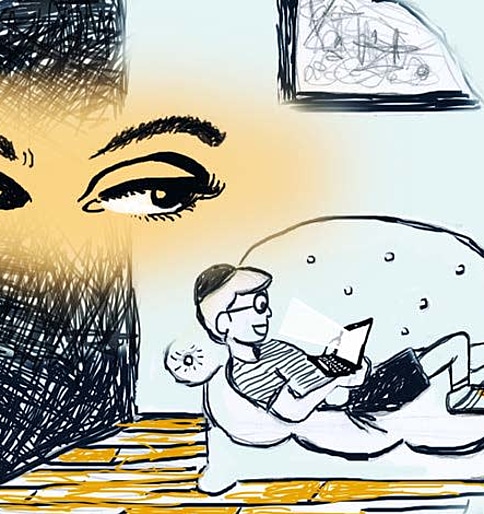Take Two Tablets and Skype Me in the Morning: The Challenges of Our Children’s Technology
Our children are digital natives while we are the digital immigrants, and the challenges of raising healthy and socially competent children are great.

Our children are digital natives while we are the digital immigrants, and the challenges of raising healthy and socially competent children are great.

“We live in a society that is awash in drug use. Drugs are everywhere—even in Torah institutions . . . . Children from the finest families may use drugs,” Rabbi Dr. Abraham J. Twerski, noted psychiatrist and specialist in addictions, wrote in these pages back in 2008.

Kids in Pain
As told to Bayla Sheva Brenner
One of our kids dropped out of high school at fourteen. He stayed in bed every day and was out every night smoking pot. He was in really bad shape.

With Chanukah around the corner, Jewish parents everywhere can be found flocking to Jewish bookstores. Why?

The Awesome Adventures of Pickle Boy is a rousing action adventure plucked straight out of the hyper-fueled fantasy world of middle school boys.
Danny Green is an average eleven-year-old boy living with his average family in New York City when, quite by accident, he discovers a hidden cache of pickle juice in his basement and drinks it.

How can I write about emunah? I do not feel competent to deal with so great and deep a subject. I only know that our people have been rooted in emunah like a sturdy, weather-beaten tree that is firmly rooted in solid ground, constantly shooting out plants alive with growth.

Sometime in the latter part of the 19th century, Rabbi Yosef Dov Soloveitchik, the Brisker Rav and great-grandfather of the Rav, showed samples of his son Chaim’s “Torah” (original interpretations) to Reb Yisrael Salanter. Reb Yisrael commented that in the future, this type of Torah would save the Torah world from the inroads of the Haskalah.

An anecdote resonates in my mind: Raphael Waldman, who had been a journalist at the Baltimore Sun before accepting Torah observance, described an early experience as a guest at an Orthodox home. He had been asked by his hosts, in the breathless and conspiratorial tones reserved for such forays, to describe the existential conditions of life outside the Pale. “I gave them what they wanted,” he concluded. “I told them that there was nothing out there!”

He definitely gets around a lot.
You can find investor/entrepreneur Marc Belzberg, in his large kippah and sandy-colored beard, hosting 300 people at a Haifa hotel. They are all men, women and children whose families have been struck by terror, and Belzberg and his Belgian-born wife, Chantal, are there as the founders of the OneFamily Fund, a fund that provides help to these suffering families.

At first glance, a book review might be considered an odd choice for this section. However, this article by Rabbi Yitzchok Adlerstein is less of a book review and more of a deeply stirring essay—even more relevant now than it was when it was first published—about the importance of engaging in outreach with our unaffiliated brothers and sisters at this pivotal moment in Jewish history.

I had just exited the subway at Broad Street. While walking under scaffolding along Beaver Street, I heard a loud boom. I cowered, thinking something was about to fall on me, but to my relief nothing did. When I got to the corner of Beaver and Broadway, near the OU building, I had my first real inkling that something was very wrong.

In the sweep of Jewish history, thirty years are but a blink of an eye—but the last three decades have witnessed a variety of changes in Jewish life, some for the good and others not so, some minor-but-briefly-captivating and others of more lasting significance, some sociological, theological or historical. Here are some of the Jewish events that have taken place between 1985 and 2015, both in the Orthodox community and the wider Jewish community:

[Rav Reines] firmly adhered to the belief that religious Jews could cooperate with “free-thinkers” for the purpose of settling European Jews in the Land of Israel; this cooperation, he felt, could be achieved without compromising one’s religious standards. He labored hard, often in the face of vehement and even violent opposition, to encourage religious Jews to join the Zionist movement.

These family-friendly dishes are perfect for any occasion, especially for Chanukah. They are creative, look fantastic, taste scrumptious—and they’re fairly easy to make. Old classics prepared with new flair, these delicious, diverse dishes come from three of today’s best-selling cookbook authors. Their culinary creations are sure to lighten up the mood when the weather turns chilly. Small bites, big flavors—these dairy dishes are sure to please the fussiest of eaters at your Chanukah celebrations!

Mazal Tov! Methuselah is a father. At the age of ten (plus 2,000!), perhaps the oldest tree to be germinated from an ancient seed, Methuselah has been successfully pollinated with another date palm, which is producing offspring.

Our communities have been dumbstruck by what feels like an onslaught of rabbinic scandals . . . Are there any known factors that cause a rabbi to commit acts that dishonor his calling? What can be done on the part of the rabbinate to reclaim and restore its dignity, when a fragment of its members engage in exploits that tarnish its reputation?
We often associate the reflourishing study of Tanach in the Orthodox community with the impressive analytics of the “New School” that effectively began with Nehama Leibowitz and continues to this day. Yet with all the brilliant lectures, journals and books, are the average laypeople neglecting the basics?

Isaac Bashevis Singer, the Nobel prize-winning Yiddish author, was once famously asked, “Do you believe in free will?” He wryly replied, “Of course! Do I have a choice?”

On Shabbat morning, July 4, 1863, in Mikveh Israel Congregation in Philadelphia, Sabato Morais, not knowing that the Union had been victorious in the Battle of Gettysburg and fearing for the safety of the northern cities, uttered the following prayer: “Encircle Pennsylvania with Thy mighty shield, protect the lives of her inhabitants.” However, mindful of July 4th, his sermon also recalled American independence as “the event which fourscore and seven years ago brought to this New World light and joy.”

Some months ago, inside the entrance of a small museum in a non-Orthodox synagogue in the center of London, I saw an apparently incongruous sight—a display case featuring several unrolled Torah scrolls and a large black-and-white photograph of a Chassidic Jew seated at a wooden drafting table.
Misconception: All boys must begin putting on tefillin thirty days before their bar mitzvahs.
Fact: There are two main opinions in halachah: boys should either begin laying tefillin several years before their bar mitzvah or on the actual day of the bar mitzvah. However, in some circles, there is a widely accepted practice for boys to start wearing tefillin approximately thirty days prior to their bar mitzvah.

OU Press is working on a host of exciting projects that will appear over the next few months. Some focus on the teachings of the preeminent Talmudist and philosopher Rabbi Joseph B. Soloveitchik. All bear the same hallmark of quality you have come to expect from OU Press.